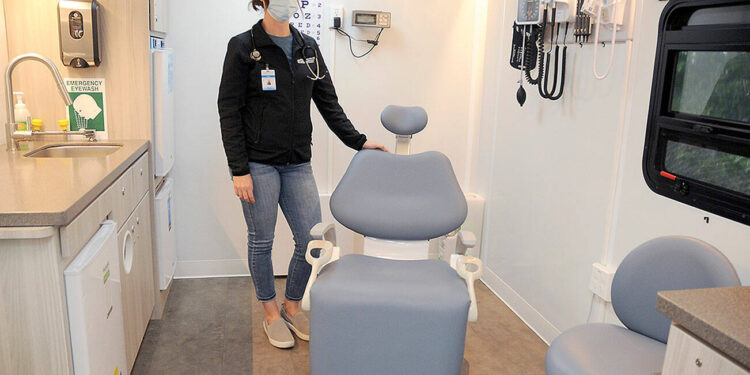PORT ANGELES — The 38-foot-long blue and white motorhome pulling into school district parking lots during the new school year is on a different kind of road trip.
The journey is short, the stops are frequent and the view out the window doesn’t change all that much. But it’s the healthcare the motorhome delivers directly to students that makes it special.
The mobile clinic is a partnership between the North Olympic Healthcare Network (NOHN) and the Port Angeles School District to bring medical and behavioral healthcare to all five of the district’s elementary schools, Stevens Middle School and Port Angeles High School on a regular, often weekly, basis.
Students enrolled in the school district’s online Seaview Academy and other distance-learning programs can visit any of the in-person sites.
This is the first full school year in which NOHN will operate the mobile clinic after it was delivered in November 2021.
Built on a Winnebago chassis, the $400,000 mobile clinic was designed with privacy and an economical use of space in mind. It is outfitted with an examination room at the rear of the vehicle and a small room near the front for behavioral health visits.
“It will be just like walking into a doctor’s office,” said Kate Weller, chief medical officer at NOHN who oversees the mobile clinic program.
“We may not be able to do all of the things that a clinic can do. We’re not able to stock every single medicine or all supplies or treat a fracture, but we can make referrals and bring care to the student where they’re at.”
Primary care is provided by adult nurse practitioners and physician assistants, while licensed clinical social workers and marriage and family therapy counselors offer behavioral health support.
From treating a sinus infection to caring for problems with bullying, the mobile clinic offers a range of basic services, including:
• Primary care
• Sport physicals
• Care for chronic health conditions like asthma
• Immunizations
• Behavioral/mental health care
Although a sign on the side of the mobile clinic says “dental care,” it isn’t offering this service yet and, in any case, will only offer basic dental care like screening. Students who need full-service dental care, such as surgery or fillings, will be referred to local providers.
Getting care
To be able to visit the mobile clinic, students must have a signed consent form from a parent or guardian on file with NOHN or bring it with them to their appointment. A new, signed consent form must be submitted every year.
The consent form can be found online at tinyurl.com/2tupk8ek and emailed to Becca Larsen, the school district’s family navigator, at: [email protected].
Although drop-ins are allowed, NOHN would prefer students make appointments to visit the mobile clinic by contacting Larsen.
Both parents and primary healthcare providers will be informed whenever a child visits the mobile clinic except in specific circumstances which under state law allow minors to receive confidential health services, such as:
• Alcohol/drug abuse treatment (13 and older)
• Outpatient mental health treatment (13 and older)
• Birth control (any age)
• Pregnancy care (any age)
• STD/HIV diagnosis and testing (14 and older)
The mobile clinic is not free. NOHN will bill medical insurance providers for students who are covered by their parent or guardian’s plan and will work with families who are uninsured to help students get the care they need.
“No one will be turned away,” said Michael Maxwell, CEO of NOHN.
Students and families who need help paying for services can apply to NOHN’s financial assistance program, which has a sliding fee scale based on family size and income.
Partnership
A need for enhanced school health services was brought to NOHN’s attention by the Port Angeles Citizen Action Network (PA CAN) in 2016, said Jeff Anderson of NOHN in an email. As a result, NOHN, PA CAN and the school district developed a concept for a school-based healthcare center.
A room at the high school was used as a clinic for part of the 2017 school year to gauge what kinds of health services might be in demand.
“What we found was the need went beyond high school and what we had anticipated, particularly behavior health,” Maxwell said.
Based on feedback from students, teachers, counselors and staff, creating a mobile health service was proposed in 2019 to the school board, which supported the idea. Coincidentally, 87 percent of those who participated in a Community Health Needs Assessment conducted by NOHN the same year also identified developing a mobile health services as a priority.
The mobile clinic is being paid for out of a $3.3 million grant NOHN received from the United Health Foundation that is funding a broader community health project. It does not use taxpayer dollars.
The grant is also helping to cover NOHN’s payment to the school district of the $162,000 a year to pay for two full-time family navigators who assist students and parents in finding, accessing and paying for a range of medical, behavioral and social services.
The NOHN and the schools district’s agreement, signed by superintendent Marty Brewer, began July 1, 2021, and will run through June 30, 2024.
Brewer said in an interview in June that the mobile clinic deepens and expands the district’s dedication to providing students with health, emotional and social support.
“This goes beyond academics,” Brewer said in June. “We are providing more resources and working with our community partners to help students.”
In addition to NOHN, those partnerships include Peninsula Behavioral Health.
Weller said one of the most pressing tasks for NOHN has been trying to get the word out about the mobile clinic.
“We know what we can do,” Weller said. “We need to let people know what it is and how to use it.”
________
Reporter Paula Hunt can be reached at [email protected]

















Discussion about this post